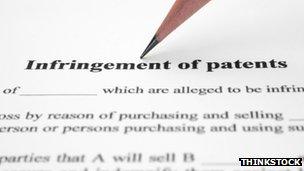'Patent trolls' cost other US bodies $29bn last year, says study
- Published

The direct cost of actions taken by so-called "patent trolls" totalled $29bn (£18.5bn) in the US in 2011, according to a study by Boston University.
It analysed the effect of intellectual rights claims made by organisations that own and license patents without producing related goods of their own.
Such bodies say they help spur on innovation by ensuring inventors are compensated for their creations.
But the study's authors said society lost more than it gained.
The research covered industry bodies that refer to themselves as "non-practising entities" (NPEs). They include businesses that buy patents with the sole aim of licensing them out, individual inventors, universities and companies that assert patent rights unrelated to the products they make.
The "direct costs" included lawyers' bills and licence fees. But authors James Bessen and Michael Meurer - both from Boston University's school of law - said other charges meant their study only reflected part of the impact.
"This [$29bn] figure does not include indirect costs to the defendants' businesses such as diversion of resources, delays in new products, and loss of market share," they wrote.
"Even so, the direct costs are large relative to total spending on [research and development], which totalled $247bn in 2009, implying that NPE patent assertations effectively impose a significant tax on investment in innovation."
Legal fees
The academics said that actions by NPEs meant 2,150 companies had to mount 5,842 defences to lawsuits last year, according to figures from RPX - a business that rents out patents but has promised never to launch a lawsuit of its own.
They noted that corporate giants were not the only ones to suffer. Their research suggested companies earning less than $100m a year in revenue accounted for half of all cases. Such firms - they said - subsequently had less money to invest in their own research.
The authors added that about one quarter of the cost of NPE litigation consisted of legal fees - money, they said, that could otherwise be used to fund innovation.
Intellectual Ventures, one of the highest-profile NPEs, was not available for comment.
However, its co-founder Nathan Myhrvold recently defended its actions at the Wall Street Journal's D10 conference .
"It's very hard for individual inventors to get paid... in the case of patents, many that own them aren't in a good position to take the next step," he said.
"If you don't enforce your rights, no-one is going to enforce them for you."
Intellectual Venture's co-founder Peter Detkin later commented on the study to the blog Gametime IP saying that it was wrong to infer the wider NPE industry was at fault because of the actions of a smaller number of bad actors.
"They are taking a small piece of the puzzle and extrapolating out to the entire puzzle," it quoted him as saying.
"They take that point and then say 'therefore, all patent assertion by non-practicing entities is bad.' And that's like saying all personal injury litigation is bad."
- Published8 November 2011
- Published24 October 2011
- Published12 June 2012